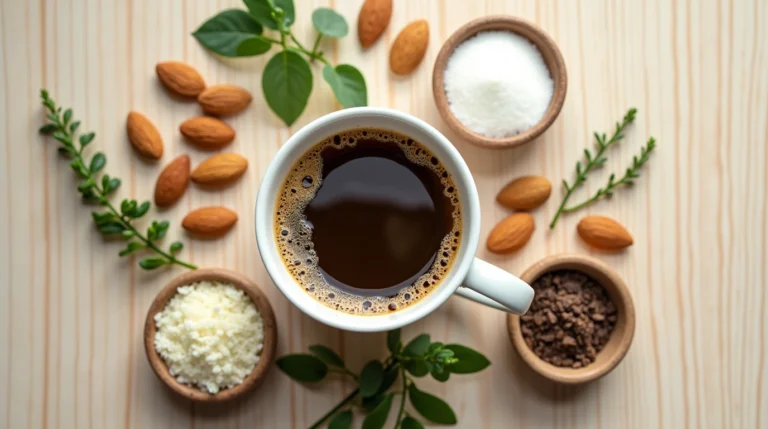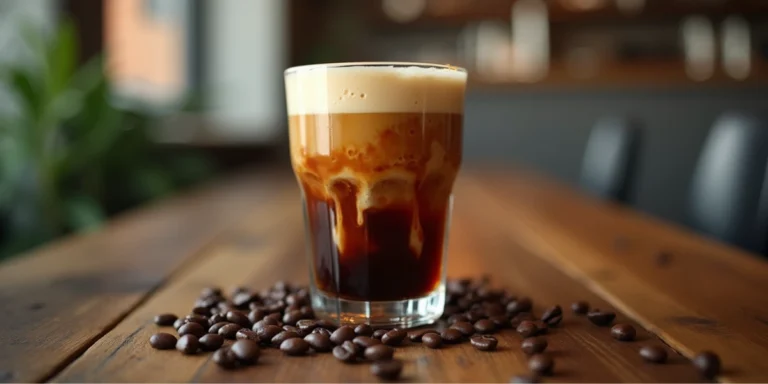Is the Coffee Loophole Real? What You Need to Know
If you’ve spent any time on social media lately, especially TikTok or Instagram, you’ve probably seen people talking about the mysterious “coffee loophole.” It’s being hailed as a secret hack for weight loss, a diet-friendly morning ritual, and even a guilt-free way to keep your energy up while fasting. But what is the coffee loophole, and is it actually real—or just another health trend that’s too good to be true?
In this post, we’ll break down what the coffee loophole really means, how it works (according to its fans), and whether it holds up to expert scrutiny. Whether you’re an intermittent faster, a keto dieter, or just a curious coffee lover, you’ll get the facts, the recipes, and the truth behind the buzz.

Recipes That Fit the Coffee Loophole Approach
One of the reasons the coffee loophole has gained so much popularity is because it’s not just about drinking plain black coffee—it’s about optimizing your cup to support your goals. Many coffee lovers are experimenting with low-calorie, fat-burning “coffee hacks” that help them stay full, energized, and on track with their diet plans. Below are some of the most popular additions, guidelines, and recipes that align with the coffee loophole trend.
Popular Morning Coffee “Hacks” for Weight Loss
The classic version of loophole coffee is simple: black coffee, no cream or sugar. But for those who want more from their morning brew, several “hacks” can enhance its effects:
- Bulletproof-style coffee – A blend of black coffee with healthy fats like MCT oil or grass-fed butter. Though it adds calories, this drink is popular in the keto and low-carb communities because it can support ketosis, curb cravings, and provide lasting energy.
- Cinnamon coffee – Adding cinnamon not only boosts flavor without sugar, but it may also help regulate blood sugar levels and reduce appetite.
- Green coffee extract – This is made from unroasted coffee beans and is rich in chlorogenic acid, a compound believed to aid weight loss and reduce fat absorption.
These additions are usually calorie-light and metabolism-friendly, making them good fits for those using coffee as part of their weight management routine.

Ingredients That Work Well with the Coffee Loophole
The key to staying in the “loophole zone” is choosing ingredients that support your goals without triggering an insulin response or breaking your fast. Here’s a quick-reference table:
| Ingredient | Quantity | Purpose |
|---|---|---|
| Black Coffee | 1 cup | Base, zero-calorie stimulant |
| MCT Oil | 1 tbsp | Fat-burning support, sustained energy |
| Cinnamon | 1/2 tsp | Appetite suppression, flavor boost |
| Green Coffee Extract | Optional | Antioxidants, metabolism support |
| Stevia or Monk Fruit | 1 packet | Natural sweetness without calories |
Tip: Avoid using regular sugar, flavored creamers, or milk if you’re trying to stay within the “coffee loophole.” These add calories and can spike insulin levels, reducing the loophole’s intended effects.
What to Avoid to Stay in the “Loophole Zone”
To make the most of the coffee loophole, it’s important to avoid ingredients that can break your fast or hinder weight loss. Here’s what to leave out:
- Sugar – Adds unnecessary calories and can cause blood sugar spikes.
- Artificial sweeteners with calories – Some sugar substitutes still trigger an insulin response.
- Milk and cream – Even small amounts contain calories and carbs.
- High-calorie syrups or flavored creamers – These can quickly turn your loophole coffee into a dessert.
3 Easy “Loophole-Friendly” Coffee Recipes to Try
Looking to upgrade your coffee while keeping it weight-loss friendly? Here are three simple recipes to get started:
- Cinnamon Black Coffee
- Brew 1 cup of black coffee
- Stir in ½ tsp of ground cinnamon
- Optional: Add a dash of stevia for sweetness
- Fat-Fueled MCT Coffee
- Brew 1 cup of hot black coffee
- Add 1 tbsp of MCT oil
- Blend until frothy for a creamy, latte-like texture
- Green Coffee Booster
- Brew 1 cup of black coffee
- Mix in 1 capsule (or recommended amount) of green coffee extract
- Stir well and drink warm
What Is the Coffee Loophole and Why Is It Trending?
In today’s world of quick hacks and viral health trends, the “coffee loophole” has become one of the internet’s most talked-about secrets. But despite its catchy name, the coffee loophole isn’t actually about breaking rules—it’s about bending them in a way that feels smart, strategic, and satisfying.
The Rise of the “Coffee Loophole” on TikTok and Social Media
Social media platforms like TikTok, Instagram, and YouTube Shorts have become hotspots for the growing buzz around the “coffee loophole.” Influencers, fitness experts, and wellness enthusiasts are sharing how their simple morning coffee routine is helping them boost energy, support weight loss, and even curb hunger—without technically breaking their diet.
Hashtags such as #coffeeloophole, #fastingcoffee, and #weightlosscoffee have attracted millions of views, fueling a trend that blends health-conscious habits with a sense of clever indulgence. The concept resonates because it feels like a smart workaround—a way to enjoy something satisfying while still staying on track with your goals.
How the Term Ties into Intermittent Fasting and Weight Loss
The coffee loophole is especially popular among people practicing intermittent fasting (IF)—a method where you only eat during a specific window of the day. During the fasting window, you’re technically supposed to avoid calories.
But many IF followers argue that black coffee, being virtually calorie-free, doesn’t break the fast. In fact, it may even boost metabolism, curb appetite, and enhance fat burning thanks to its caffeine content.
For this reason, black coffee (sometimes enhanced with metabolism-friendly ingredients) has become a go-to tool for people trying to lose weight without feeling deprived.

The Psychology Behind Calling It a “Loophole”
The term “loophole” adds a psychological twist—making the practice feel clever and indulgent. Instead of saying “I’m skipping breakfast,” people say, “I’m using the coffee loophole.” It sounds smarter. It feels like you’re hacking the system.
This kind of framing helps people stay more consistent with their health goals because it reframes restriction as strategy—which is much more motivating.
Viral Coffee Trends People Are Calling the “Coffee Loophole”
Here are some of the most popular ways people are applying the coffee loophole online:
- Black Coffee During Fasting Windows
– No calories, no cream, no sugar. Just pure caffeine to keep hunger at bay. - Bulletproof Coffee (with MCT Oil or Grass-Fed Butter)
– Though technically not fasting-compliant, many keto dieters use this high-fat coffee to prolong satiety and enter fat-burning mode. - Coffee with Appetite Suppressants like Cinnamon or Green Coffee Extract
– These additions are believed to help regulate blood sugar and reduce cravings while keeping calorie counts low.
How the Coffee Loophole Supposedly Works
The concept of the “coffee loophole” is rooted in how black coffee interacts with the body, especially during periods of fasting or low-calorie intake. Supporters of this trend claim that a simple cup of black coffee can support weight loss, boost metabolism, and reduce appetite—all without interfering with your diet goals. But how exactly does it work?
Black Coffee and Its Impact on Insulin and Metabolism
One of the key ideas behind the coffee loophole is that black coffee contains virtually no calories, meaning it won’t cause a spike in insulin levels. Insulin is the hormone that helps your body store fat and regulate blood sugar. When insulin stays low—as it does during fasting—your body is more likely to burn stored fat for energy.
Black coffee also contains caffeine, which stimulates the central nervous system and can increase your metabolic rate. Studies have shown that caffeine may temporarily raise your metabolic rate by 3–11%, helping your body burn more calories throughout the day—even when you’re not actively exercising.
Appetite Suppression and Caffeine’s Role in Fat Burning
Caffeine isn’t just a wake-up call for your brain—it may also help suppress hunger. By reducing levels of the hunger hormone ghrelin, caffeine can help you go longer without feeling the urge to eat, making it easier to stick to a fasting schedule or calorie-controlled diet.
Additionally, caffeine promotes the breakdown of fat cells by stimulating lipolysis—a process where stored fat is converted into fatty acids that your body can use for energy. This fat-burning effect is one of the reasons caffeine is commonly found in weight loss supplements.
Why Some Say It Helps During Intermittent Fasting
For those practicing intermittent fasting, black coffee has become a go-to tool. Because it’s calorie-free, it doesn’t technically “break the fast.” At the same time, it provides mental clarity, energy, and appetite control, making it easier to power through the fasting window without eating.
The coffee loophole, then, is essentially a strategic use of coffee to support fat burning and fasting goals—all without giving up the morning ritual many people love.
Benefits of Drinking Black Coffee on an Empty Stomach
Here are some of the commonly cited benefits of consuming black coffee first thing in the morning:
- Boosts metabolism and encourages fat burning
- Suppresses appetite, helping reduce overall calorie intake
- Improves focus and energy, especially during fasting hours
- Supports intermittent fasting without breaking your fast
- No added calories, sugar, or dairy—ideal for clean eating plans
Is the Coffee Loophole Legit or Just a Trend?
With all the buzz on social media, it’s easy to assume the coffee loophole is just another fleeting wellness trend. But is there any real science behind it? Or is it simply a clever way to rebrand drinking black coffee? Let’s explore what health professionals, researchers, and nutritionists actually say about this phenomenon—and what you should consider before making it a regular part of your routine.
What Nutritionists and Health Experts Say
Most nutritionists agree that black coffee, in moderation, can be a useful tool for supporting certain weight loss strategies like intermittent fasting or low-carb diets. Coffee is naturally rich in antioxidants and contains caffeine, a stimulant known to boost metabolism, increase energy levels, and suppress appetite.
However, health experts caution that while coffee can be supportive, it’s not a magic solution for fat loss. It works best when combined with a balanced diet, regular physical activity, and adequate sleep. Overreliance on coffee—or loading it with fats or sweeteners—can lead to unintended side effects, including digestive issues, energy crashes, or dependency on stimulants.
Common Myths vs. Scientific Facts
Let’s separate the hype from the truth when it comes to the coffee loophole:
| Myth | Fact |
|---|---|
| Coffee alone will help you lose weight | Coffee may support weight loss as part of a healthy lifestyle, but it’s not a standalone solution |
| Bulletproof coffee is zero-calorie | Bulletproof-style coffee contains hundreds of calories from fat, which can break a fast |
| Coffee detoxes your body | Your liver and kidneys do the detoxing—coffee may support metabolic health, but it’s not a cleanse |
| Any coffee works during fasting | Only black coffee (no sugar or cream) keeps you in a fasted state |
Understanding these distinctions helps you make informed choices rather than falling for marketing hype or viral claims.
How to Safely Use Coffee in Your Weight Loss Plan
To make the most of the coffee loophole without risking your health, follow these evidence-based tips:
- Stick to black coffee during fasting periods: Avoid adding calories if your goal is to stay in a fasted state.
- Limit your intake to 2–3 cups per day: Too much caffeine can lead to anxiety, insomnia, or dehydration.
- Listen to your body: If coffee makes you jittery, nauseous, or causes a crash later, scale back or pair it with food.
- Use it as a complement—not a crutch: Coffee can enhance your energy, but it shouldn’t replace proper meals or a nutrient-rich diet.
Also, be cautious about supplements like green coffee extract or “weight loss coffees” marketed online. Some may contain hidden ingredients or stimulants that aren’t well-regulated. Always consult with a doctor or dietitian before adding supplements to your routine.
Pros and Cons of Following the Coffee Loophole Trend
Here’s a quick summary of the benefits and downsides to help you decide if the coffee loophole fits your lifestyle:
| Pros | Cons |
|---|---|
| Can help suppress appetite during fasting | Too much caffeine can cause jitters or disrupt sleep |
| May support metabolism and fat burning | Not effective as a standalone weight loss method |
| Easy to incorporate into daily routine | Can lead to reliance on stimulants |
| May improve focus and energy | Bulletproof versions can be high in calories |
Conclusion
The coffee loophole has become a popular trend, largely thanks to its appeal on social media and its potential benefits for weight loss and fasting. While there’s no doubt that black coffee can offer metabolism-boosting effects, appetite suppression, and an extra energy kick, it’s important to remember that it’s not a magic bullet for weight loss. It works best when combined with a balanced diet, regular exercise, and a healthy lifestyle.
While there are many tempting “hacks” and viral recipes out there, it’s crucial to understand that moderation is key. Too much caffeine can have negative effects, and certain coffee additives—like butter or sugar—can derail your fasting goals.
As always, if you’re considering making coffee a regular part of your weight loss or wellness routine, consult with a healthcare professional to ensure it fits with your personal needs. Whether you’re a coffee lover or just curious about this trending hack, the coffee loophole can be an effective tool when used responsibly.







